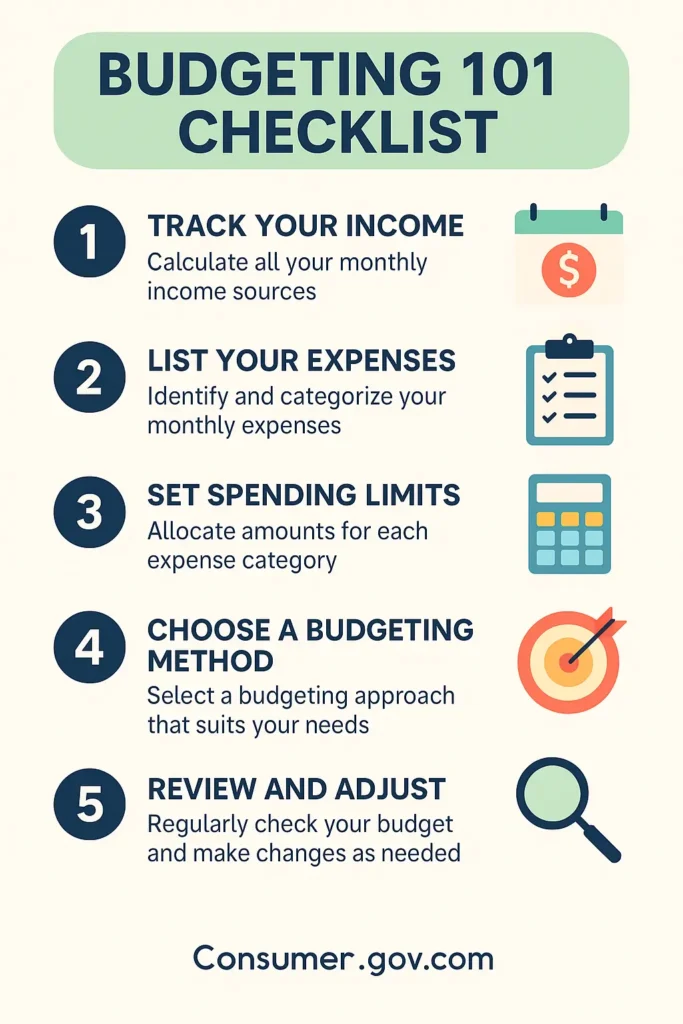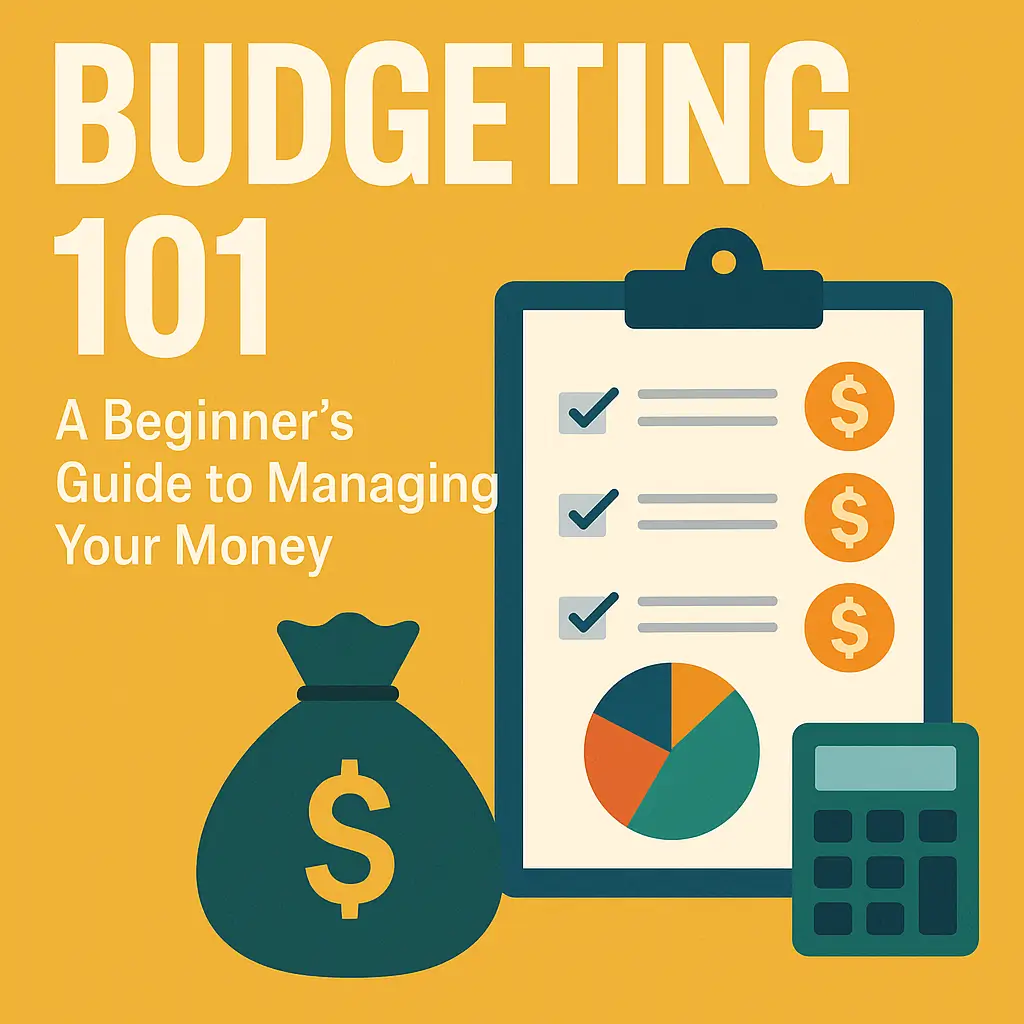Budgeting 101 is the foundation of personal financial success. Whether you’re a college student, a recent graduate, or a working professional, understanding how to manage your money effectively starts with learning how to budget. In this beginner-friendly guide, we will explain what budgeting is, why it matters, and how you can start budgeting today.
From tracking your expenses to choosing the right tools, this article will walk you through every essential concept. Our goal is to help you take control of your finances, reduce stress, and start building wealth — one budget at a time.
This article covers the following points:
- What Is Budgeting and Why Does It Matter
- Core Components of Budgeting 101
- Budgeting 101 in Action: How to Start Today
- Budgeting Methods for Beginners
- Tools and Apps to Help You Budget
- Budgeting Tips to Stay on Track
- Building Emergency Funds with Budgeting
- Common Budgeting Mistakes to Avoid
- Budgeting for Different Lifestyles
- How Budgeting Supports Long-Term Financial Goals
- Final Thoughts about Budgeting 101
What Is Budgeting and Why Does It Matter
Budgeting 101 starts with a simple definition: a budget is a plan for your money. It helps you allocate your income toward needs, wants, savings, and debt repayment. Without a budget, many people overspend, struggle with debt, or miss opportunities to save.
Why budgeting matters:
- It provides clarity and control over your finances.
- It prevents unnecessary debt and overspending.
- It helps you save for emergencies and future goals.
- It reduces money-related stress and arguments.
According to Consumer.gov, creating a personal budget is one of the most effective ways to maintain financial health.
People who budget are more likely to achieve their financial goals. A budget serves as a roadmap, guiding spending decisions in alignment with long-term priorities. Over time, this planning helps you develop discipline and resilience in the face of financial setbacks.
Core Components of Budgeting 101
To build a successful budget, you need to understand its components:
- Income: Your total take-home pay from all sources.
- Fixed Expenses: Bills that stay the same every month (e.g., rent, subscriptions).
- Variable Expenses: Costs that fluctuate (e.g., groceries, transportation).
- Savings: Amounts set aside for emergencies or goals.
- Debt Payments: Loans, credit cards, and other financial obligations.
A good budget balances these elements while leaving room for savings. Many beginners skip budgeting for occasional or annual expenses, which leads to surprises later. Categories such as gifts, car repairs, or insurance premiums should be included.
Budgeting 101 in Action: How to Start Today
Here is how to create your first budget in five simple steps:
- List Your Monthly Income: Include your salary, freelance earnings, and side hustles.
- Track and Categorize Expenses: Use tools like Mastering Expense Tracking to keep track of where your money goes.
- Set Budget Goals: Decide how much to allocate to categories like food, housing, and entertainment.
- Choose a Budgeting Method: Popular options include zero-based budgeting and the 50/30/20 rule.
- Review and Adjust Your Budget Weekly: Make it flexible. Review it each week and adjust as needed.
You don’t need to wait for the beginning of the month to start. Start tracking your expenses today and create your first budget using real data. The earlier you start, the faster you’ll gain clarity.

Budgeting Methods for Beginners
A major part of Budgeting 101 is choosing the method that suits your lifestyle:
Zero-Based Budgeting
Assign every dollar a job so that income minus expenses equals zero. Learn more in our guide: Top Budgeting Methods.
The 50/30/20 Rule
Divide your income into 50% needs, 30% wants, and 20% savings or debt payments. This method is ideal for people who want a simple yet effective framework.
Envelope System
Use cash for specific categories, such as groceries or entertainment, to limit your spending. This method helps prevent overspending by using physical limits.
Choose the system that feels natural and fits your goals. You can even combine methods, such as using 50/30/20 with cash envelopes for specific problem areas.
Tools and Apps to Help You Budget
Using technology makes budgeting easier. Recommended apps include:
- Mint (free and beginner-friendly)
- You Need a Budget (YNAB) (best for zero-based budgeting)
- EveryDollar (great for goal-based budgeting)
Some apps link to your bank account to automate expense tracking, while others offer manual entry for better awareness.
For a full breakdown, read our article on Best Budgeting and Expense Tracking Apps.
Spreadsheets are another great option. Google Sheets or Excel can be customized to your needs and are perfect for privacy-conscious users.
Budgeting Tips to Stay on Track
Creating a budget is the first step. Sticking to it is the challenge. Use these tips:
- Use cash for daily spending.
- Set automatic savings transfers.
- Review your spending weekly.
- Limit impulsive purchases with a 24-hour rule.
- Reward yourself for reaching small goals.
Want more strategies? Check out Practical Budgeting Strategies.
If you struggle with discipline, try accountability. Share your budget goals with a friend or post updates on your progress on social media.
Building Emergency Funds with Budgeting
Every solid budget includes savings for emergencies. In Budgeting 101, your first goal should be to build a $500 to $1000 buffer. This fund can cover:
- Car repairs
- Medical bills
- Job loss
Emergency funds prevent financial stress during crises. They also reduce the need for high-interest loans or credit card debt.
Learn how to start yours here: Financial Foundations: Emergency Funds
As your income grows, aim for 3 to 6 months of living expenses in a separate high-yield savings account.
Common Budgeting Mistakes to Avoid
Avoid these pitfalls:
- Forgetting irregular expenses
- Not updating your budget regularly
- Setting unrealistic goals
- Budgeting for someone else’s lifestyle
Awareness is the first step to preventing mistakes. We cover these traps in detail in Avoid Budgeting Pitfalls.
Don’t abandon your budget after one mistake. Like any habit, it takes time to develop. Progress, not perfection, is the goal.
Budgeting for Different Lifestyles
Students: Use The Ultimate Budgeting Guide for College Students to create simple and flexible budgets.
Couples: Collaborate with your partner on shared financial goals. Learn how to budget together in Budget as a Couple.
Freelancers or Variable Income Earners: Learn how to create stable budgets even with irregular earnings: Irregular Income Budgeting.
Low-Income Households: Focus on essentials first. Use community support, reduce fixed costs, and automate small savings to create momentum.
How Budgeting Supports Long-Term Financial Goals
Budgeting is the first step toward achieving any financial goal. Whether you want to:
- Pay off debt
- Save for a home
- Travel
- Retire early
You need a plan. Budgeting helps you allocate resources intentionally. It turns vague desires into actionable steps.
Use your budget to create sinking funds for specific goals. Set milestones and track your progress on a monthly basis. Financial freedom begins with daily choices.
Final Thoughts about Budgeting 101
Budgeting 101 is more than a guide — it’s your roadmap to financial confidence. The earlier you start budgeting, the more financial freedom you’ll enjoy in the future. With the tools, methods, and strategies shared here, you’re ready to take charge of your money.
Budgeting is not about deprivation. It’s about direction. When you give every dollar a purpose, you take ownership of your financial future.
Remember: every expert was once a beginner. The first step is to begin.

